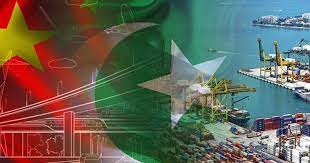Muhammad Zamir Assadi
The two-day International conference, organized by the Ministry of Planning Development & Special Initiatives in collaboration with the Embassy of the Republic of China, concluded on Tuesday with the goal of continuing to implement the China-Pakistan Economic Corridor (CPEC) for the country’s prosperity.
The conference Decade of CPEC and Belt and Road Initiative (BRI), themed “From Vision to Reality”, was organized by the Ministry of Planning Development & Special Initiatives in collaboration with the Republic of China to bring together policymakers, scholars, practitioners and other stakeholders to exchange ideas and insights related to the economic, social, environmental and geopolitical impacts of CPEC and BRI.
Federal Minister for Planning Development & Special Initiatives Ahsan Iqbal not only emphasized the importance of saving and investment in his address, but also shed light on the significant development projects that have been undertaken within the context of CPEC & BRI. Highlighting the ongoing and upcoming development projects under CPEC, the Minister elaborated on their potential to transform Pakistan’s infrastructure and economy. He underlined that these projects are not merely about physical connectivity but also aim to uplift the lives of the people and boost socio-economic development across the country.
Ahsan Iqbal specifically mentioned several key projects that have been identified as vital components of the CPEC. These include major energy infrastructure projects, such as power plants and transmission lines, aimed at addressing Pakistan’s energy needs and promoting industrial growth. He also emphasized the significance of transportation and connectivity projects, such as the development of road networks and modernization of ports, to enhance regional trade and economic integration. During the last day of the conference, four sessions were held which included Security and Geopolitical Implications, Innovation, Technology and Global Value Chains, Challenges to Regional Connectivity and Integration, Artificial Intelligence & Labor Market Dynamics.
The Conference has received 435 extended abstracts from more than 85 national and international institutes including universities, government departments, practitioners, think tanks and entrepreneurs. Following a rigorous evaluation, 310 abstracts were shortlisted to be further scrutinized by the scientific committee and the Committee accepted 110 abstracts for full paper submissions. Furthermore, the Minister highlighted the importance of the Gwadar Port, a strategic project under CPEC, which is set to become a key maritime gateway connecting Pakistan with the rest of the world. The development of Gwadar Port and its associated free zone is expected to attract foreign investment, stimulate economic activities and create job opportunities in the region.
Minister Ahsan Iqbal also underscored the need to align these development projects with sustainable practices and environmental considerations. He stressed that environmental conservation and ecological sustainability are crucial aspects that must be integrated into every phase of project planning and implementation. The Planning Minister encouraged both local and foreign investors to actively participate in these development ventures, emphasizing the government’s commitment to providing a conducive and investor-friendly environment. He assured that all stakeholders’ interests will be safeguarded and transparency will remain a cornerstone of the entire development process.
Minister Ahsan Iqbal urged everyone to carry forward the lessons learned, the connections made and the spirit of collaboration. He emphasized the potential of joint efforts to shape a brighter and more inclusive future, founded on the principles of shared prosperity and mutual respect. Later, he presented souvenirs to both Pakistani and Chinese companies who participated in the CPEC project.
The China Daily







